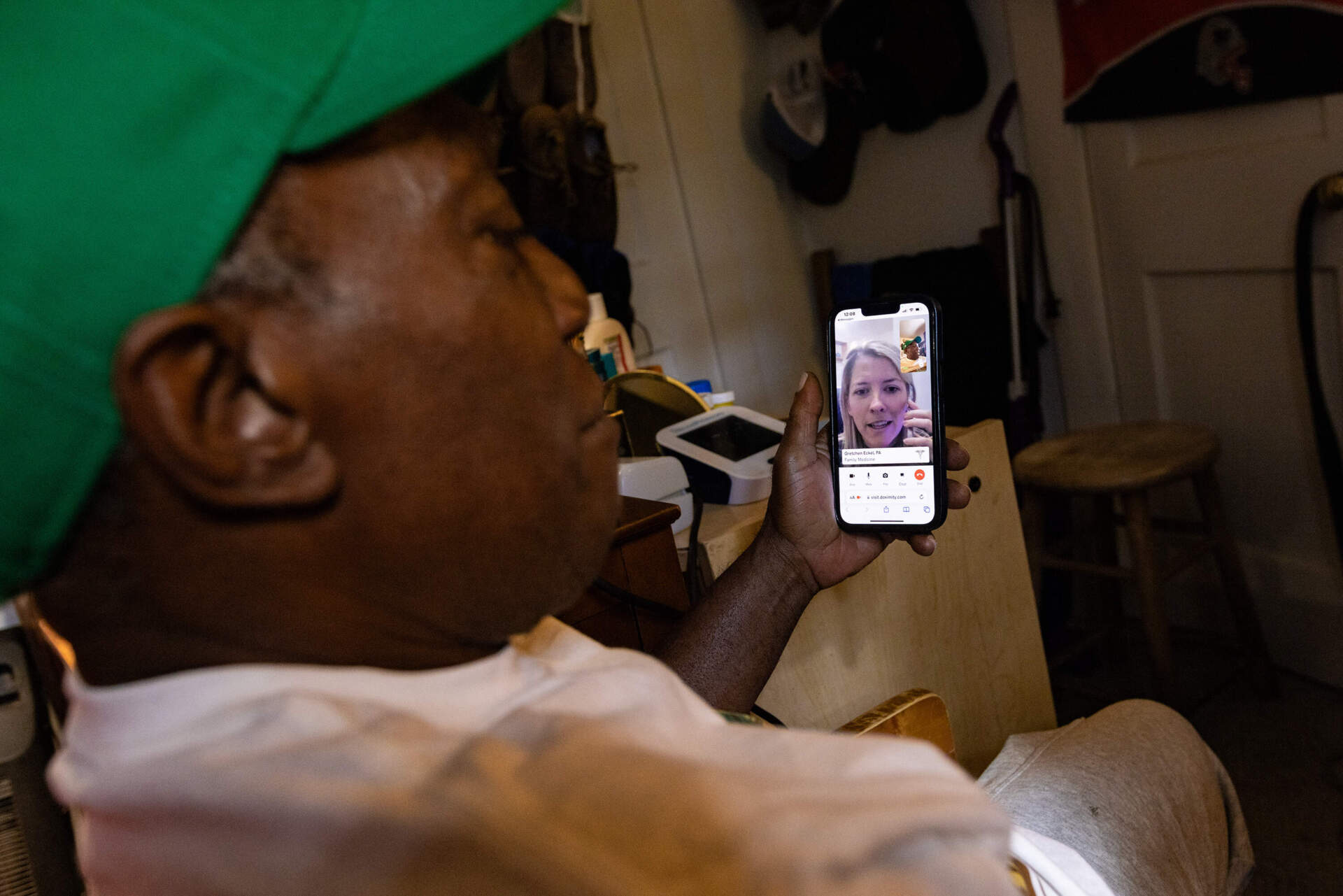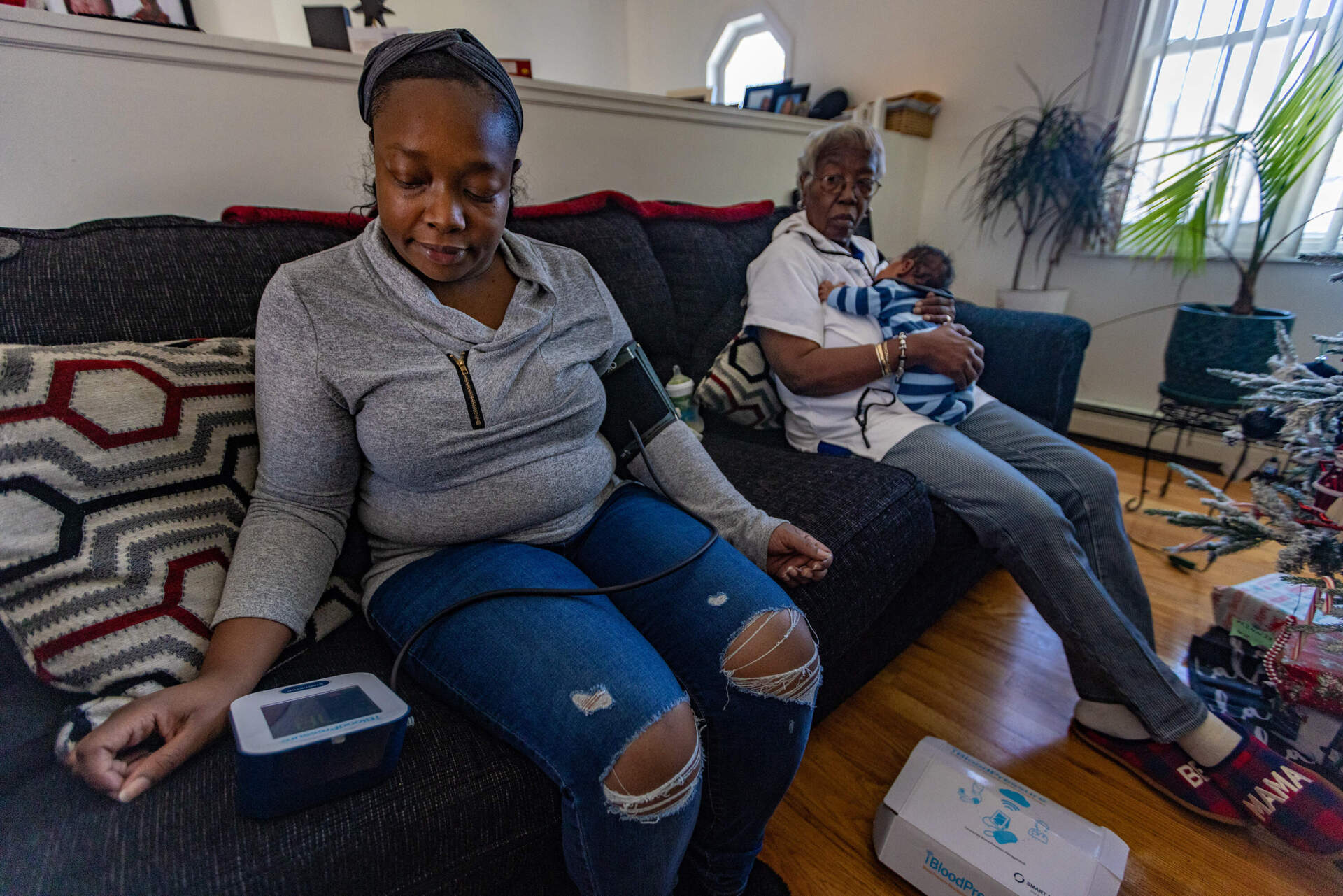Anthony Brown begins his morning with a prized possession: his blood strain cuff. The 63-year-old Cape Cod resident has hypertension, excessive ldl cholesterol and has had two strokes. He’s decided to keep away from a 3rd.
So Brown straps on the cuff each morning earlier than he heads to work, working the fry station at a seafood restaurant in Orleans, and once more each night. The cuff connects to a distant monitoring system. Every studying goes proper to workers on the group well being heart the place he’s a affected person.
“You don’t have to fret about nothing, as a result of they see it,” stated Brown. “If it is excessive, they observe up.”
Brown’s routine is a doubtlessly life-saving change from the years when he would get blood strain checks solely throughout medical workplace visits just a few occasions a 12 months. Black males like him have a 50% higher likelihood of stroke as in comparison with white males and are 70% extra prone to die.
These statistics are a part of the explanation MassHealth, the state’s Medicaid program, is now choosing up a few of the prices of distant blood strain monitoring for sufferers like Brown. It’s a method to detect warning indicators and forestall problems in high-risk sufferers.
Brown acquired his distant monitoring equipment this fall. On a morning in late October, he pulled out his telephone for a video chat along with his major care supplier, Gretchen Eckel.
She was involved as a result of his morning numbers had been creeping up. It’d’ve been the one cup of espresso he didn’t wish to surrender, the additional cigarette he smoked, or anxiousness a couple of busy day of fish-and-chip orders. However regardless of the purpose, she wished to deal with it.
“His cardiovascular threat is excessive,” stated Eckel, a household medication doctor assistant at Outer Cape Well being Providers. “If we don’t optimize his blood strain, a 3rd or ultimate stroke is inevitable.”
Through the digital appointment, Eckel requested about Brown’s food plan, his smoking and his medicines. Brown instructed Eckel he’d stopped ingesting Gatorade to chop again on salt and was checking the sodium content material of meals he buys. After some nudging, Brown agreed to strive chewing nicotine gum sometimes, as a substitute of lighting a cigarette throughout work breaks.
“Perhaps I’ll simply keep within the kitchen and never go outdoors,” he stated, sounding defeated.
Even with these modifications, Eckel instructed Brown it could be clever to strive a brand new treatment. She described two choices. The primary would doubtless trigger Brown to urinate extra typically. So he opted for Eckel’s second suggestion, regardless that it will possibly trigger dizziness in uncommon circumstances, and swelling.
“If it’s not tolerable, in case your ft are so fats you’ll be able to’t match them into your sneakers, we’ll contemplate different treatment choices,” Eckel stated. She stated the well being heart would mail him the brand new capsules.

The go to lasted 17 minutes. In individual, it could have taken a number of hours of Brown’s day, as a result of he doesn’t have a automotive.
“The bus is like an hour and a half a technique as a result of it stops in any respect the supermarkets,” Brown stated. “However I’ve no alternative, as a result of I don’t have a experience.”
Two months later, the brand new method gave the impression to be serving to. Brown had triggered only one hypertension alert since Eckel adjusted his medicines.
“We’ve been in a position to get his blood strain beneath management with out having Anthony return to the workplace as soon as but,” stated Eckel. “To place our cash, time and assets into distant monitoring for sufferers like Anthony is crucial.”
Eckel and different clinicians at Outer Cape Well being Providers have enrolled 102 sufferers of their distant blood strain monitoring program. However different group well being facilities in Massachusetts are discovering it troublesome so as to add or reorganize workers to make comparable packages work. Dr. Monica Vhora, chief medical officer at DotHouse Well being in Dorchester, stated her staff will discover a method as a result of she’s satisfied distant monitoring is sweet for sufferers.
Vhora stated blood strain numbers collected at residence are sometimes extra correct than these she sees within the clinic the place sufferers get nervous and present larger numbers — what’s generally known as “the white coat impact.”
“Distant readings maintain us from overmedicating individuals,” stated Vhora, “so it actually impacts how we handle their blood strain.”
MassHealth started masking a variety of distant monitoring gadgets and care in August for sufferers with bronchial asthma, congestive coronary heart failure, persistent obstructive pulmonary illness, diabetes, hypertension and those that are pregnant or who’ve just lately given delivery. It’s a mannequin already utilized by Medicare, the federal government insurance coverage program for older People. It’s restricted to sufferers who’ve been to a hospital throughout the final two years or are prone to needing hospital-level care.
Earlier than MassHealth began paying for distant monitoring, some hospitals and well being facilities had been already doing this, counting on funding from grants or different assets.
Over the previous few years, Boston Medical Heart has enrolled practically 3,000 sufferers in a program that screens sufferers throughout and after being pregnant. This system, anchored by a pair of watchful nurses, is meant to forestall problems akin to stroke and organ failure.
“We’ve seen from our sufferers and heard from our sufferers how priceless it’s been to their being pregnant and to their delivery expertise,” stated Dr. Naima Joseph, a maternal-fetal medication specialist at Boston Medical Heart.
Past satisfying sufferers, Joseph and her colleagues are wanting on the impression of distant monitoring on the numbers of pregnant sufferers who’re induced, have a C-section or ship prematurely.

Research recommend at-home monitoring packages could also be cost-effective. Dr. Clara Filice, deputy chief medical officer at MassHealth, stated it’s too quickly to know for certain.
One purpose MassHealth is paying for distant monitoring is as a result of hypertension — and different persistent situations — have an effect on sure racial and ethnic teams greater than others. Filice stated distant care is one a part of a broader effort by state well being officers to scale back racism and bias in well being care.
“Will this clear up disparities in Massachusetts for our members? No, not this alone,” Filice stated. “However we predict collectively, with the whole lot else, we’ve an actual alternative to start chipping away at these decades-long entrenched disparities in persistent illness care.”
Analysis exhibits that experiencing racism in on a regular basis life, effectively past the well being care system, can have an effect on individuals’s well being, together with their blood strain.
Anthony Brown, the affected person on Cape Cod, has heard about that analysis however stated he doesn’t suppose racism contributes to his hypertension. He stated he’s gotten used to day by day insults, like having a grocery store worker path him whereas he retailers. Typically, although, he will get fed up.
“At some point, I cease, I say ‘hey, why you following me round? I don’t come right here to steal, I come right here to purchase. I’m spending my cash,’ ” Brown remembered telling the worker.
Brown stated he can’t management the way in which different individuals deal with him. So he focuses on what he can change — taking higher care of himself.

